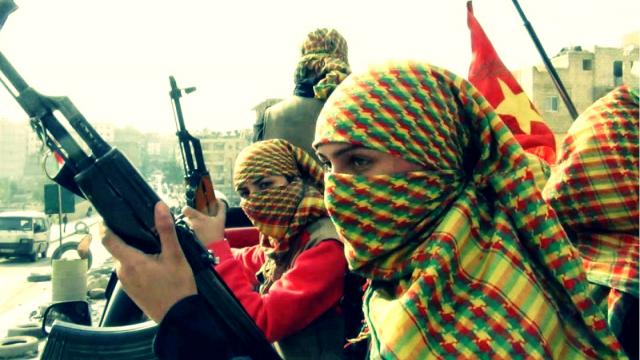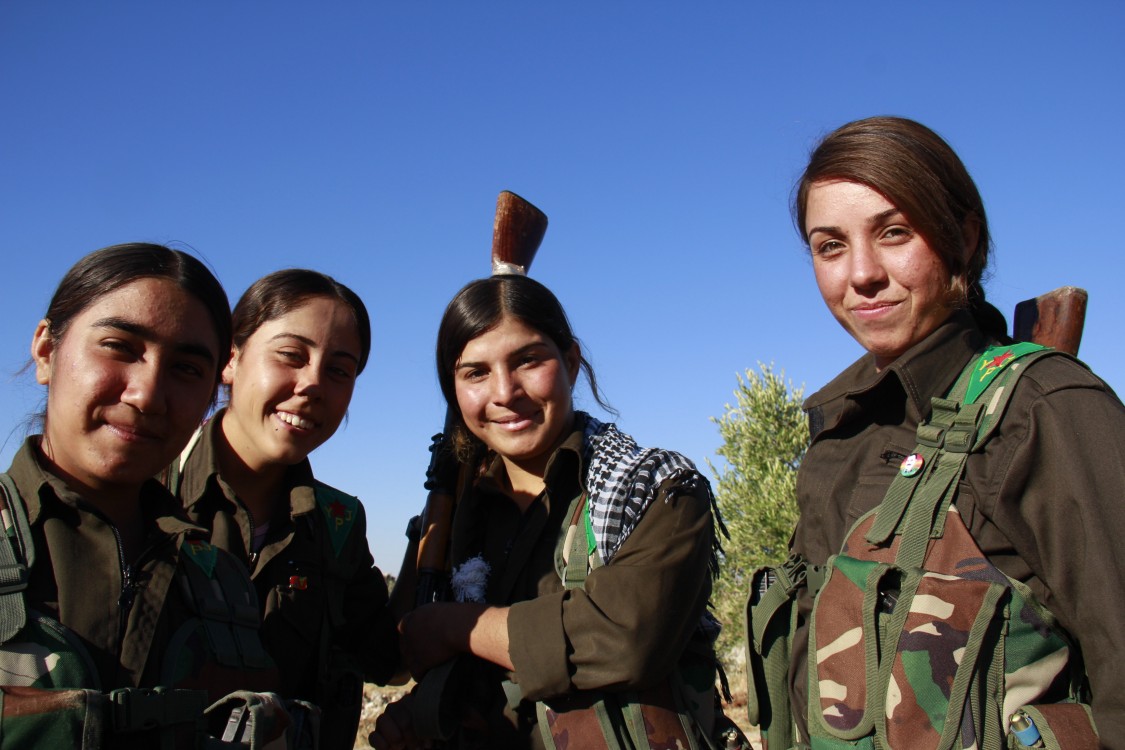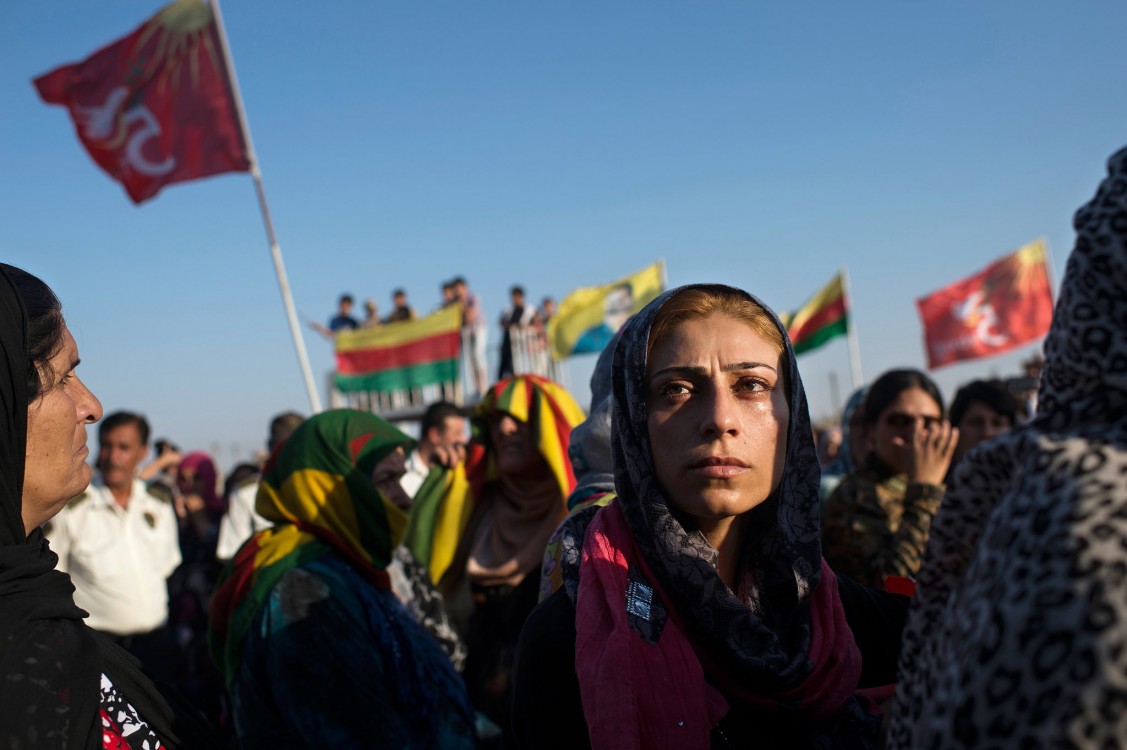
This is the second part in a series looking at the radical social and economic changes occurring in the Kurdish communities of Rojava, northern Syria. Read the first part here.
Many politicians in the West may talk about fighting ISIS, but as many know, the West helped to build – then poured fuel on – the jihadist-fascist bonfire. In contrast, the strongest challenge to ISIS is in fact the democratic, autonomous and predominantly Kurdish region of Rojava in northern Syria. The area shows a route toward a peaceful, progressive Middle East. But the West is doing far more to harm than help the bottom-up revolution in Rojava.
Fuel to the Fire
The jihadist-fascist force of ISIS formed in large part due to Western oil-driven imperialism – not least from the devastation caused by the US-led invasion of Iraq. ISIS has captured Iraqi heavy weapons and armored vehicles given by the U.S. and its allies. In addition, the group gets significant funding from Qatar and Saudi Arabia, two of the West’s crucial oil suppliers and weapon customers. ISIS even profits greatly from black market oil sales. Arguably, no terrorist organization has ever been so integrated into the oil-based global capitalist system.
Western imperialism also acts as an ISIS recruiting agent, starting with illegal drone wars that drive young people into the fascist-jihadist group. Other ISIS propaganda opportunities include Western war crimes; torture camps like Guantanamo; extra-judicial killings, and other human rights abuses. Climate change, itself the product of capitalism’s unquenchable thirst for oil, has also assisted ISIS: it catalyzed drought crisis conditions in Syria, which alongside the brutal Assad regime, led to the Syrian Civil War. As it did in in Iraq, ISIS was able to capitalize on the chaos and spread quickly through Syria.
Rojava Resists ISIS
In its brutal advance across Syria and Iraq, ISIS portrayed itself as invincible until its first major defeat in Kobanî, Rojava, between late 2014 and early 2015. With their victory, the self-organized Kurdish People's Defense Units (YPG) gained international attention and recognition. A mixed fighting force of men and women, the YPG along with the women-only YPJ have arisen as the primary challenge to ISIS in the region. The empowerment of women – expressed in part through the YPJ – is central to the Rojava democratic model and will be explored in the next Rojava installment.
How Did Rojava Emerge?
The same Arab Spring and Syrian uprising that led to the wider Syrian Civil War also enabled the Rojava Revolution. On July 19, 2012, public uprisings in Kurdish cities, one after the next, enabled Kurds to liberate the northern region of Syria from Assad's Ba’ath regime, beginning in Kobane City. Two factors were crucial for the Kurds' long-term stability, which were absent in much of the Arab Spring. First, the Kurds were expanding on a long history of bottom-up self-organization, with strong ties to the Kurdistan Workers' Party (PKK), which for decades has fought against Turkish oppression. Second, the Assad regime had largely fled the region, and his forces mostly surrendered peacefully.
This power vacuum enabled the Rojava democratic experiment to begin. In its place flourished a democratic confederalism in which autonomy and democratic decision-making took root at the local level. The Rojava autonomous region is a relatively peaceful sanctuary, yet it is besieged by enemies on every side. Its social contract welcomes every refugee. It is also perhaps the only place anywhere that recognizes every single international human right treaty.
Throughout the 20th century and continuing today, the Kurds remain the world's largest ethnic population without a state, with most of their 35 million people extended across Turkey, Iraq, Syria and Iran. To unpick how their complex and often brutal history has transformed northern Syria, the book Revolution in Rojava is the most comprehensive account to date. It explains how Kurdish freedom fighters shifted from trying to gain their own state to living beyond the state – in a bottom-up democracy of their own making.
A Model for a Progressive Middle East
Revolution in Rojava details the way Kurdish democratic confederalism provides a way out of the bloody Syrian Civil War. Rojava’s social contract stresses how the region aims at “mutual and peaceful coexistence and understanding between all strands of society. It protects fundamental human rights and liberties and reaffirms the peoples’ right to self-determination.”
To expand these principles beyond the Kurdish northern region of Syria, the Syrian Democratic Council and Syrian Democratic Forces were set up in October 2015. The former is a political party; the latter a new defense force. SDF, with some Western collaboration, is currently attempting to liberate Raqqa, a city that has served as ISIS's Syrian headquarters.
Rojava and Western Insecurity
Rojava is not only fighting ISIS and other jihadist groups to the south. It is also under strong embargo on its border to the north and east, enforced by Turkey and Kurdish Iraq. Meanwhile, Turkey continues to bomb the PKK and allow ISIS to move easily over the border to sell stolen goods and resupply with weapons and foreign recruits. After the New Years nightclub massacre claimed by ISIS in Istanbul, changes to Turkey's border policies may ensue. But nonetheless, Turkish attacks on Rojava mirror the historic and ongoing human rights abusesendured by Kurds in the Turkish state.
At the same time, Iraqi Kurdistan supports Turkey as its main, closest ally. It also opposes Rojava since its democratic model conflicts with Iraqi Kurdistan, a country known for its rampant corruption and cronyism.
The West’s Relationship with Rojava and ISIS
Writing in the Guardian, David Graeber explains that the West could easily pressure NATO member Turkey to stop supporting ISIS and, simultaneously, to stop attacking Rojava. The overarching failure of Western nations not to achieve this dual-goal begs a vital question: is Western leadership more threatened by the democratic confederalism initiated by the Kurds than they are by ISIS terrorism?
After all, ISIS serves as a strong propaganda tool for politicians in the West who want to see more business as usual while extending the War on Terror and cracking down on immigration.
With the Trump presidency nearing in the U.S., there seems little hope for a change in broader policy. In rhetoric, at least, Trump has made ISIS enemy number one. But his national security advisor, retired Lt. Gen. Michael Flynn, is linked via a Dutch lobbying firm to the interests of Turkish President Recep Tayyip Erdogan. It remains to be seen who will really be calling the shots.
If Western politicians are serious about tackling ISIS, they should be supporting Rojava – and at the same time criticizing the tacit support that Turkey is lending to ISIS. Meanwhile, they should pressure Kurdish Iraq and Turkey to end the embargo on Rojava and remove the Kurdish People's Defense Units from international terrorist lists. In a conflict that is seemingly without beginning or end, these steps would at least be a move in the right direction.
This is the second part in a series looking at the radical social and economic changes occurring in the Kurdish communities of Rojava, northern Syria. Read the first part here.
3 WAYS TO SHOW YOUR SUPPORT
- Log in to post comments













